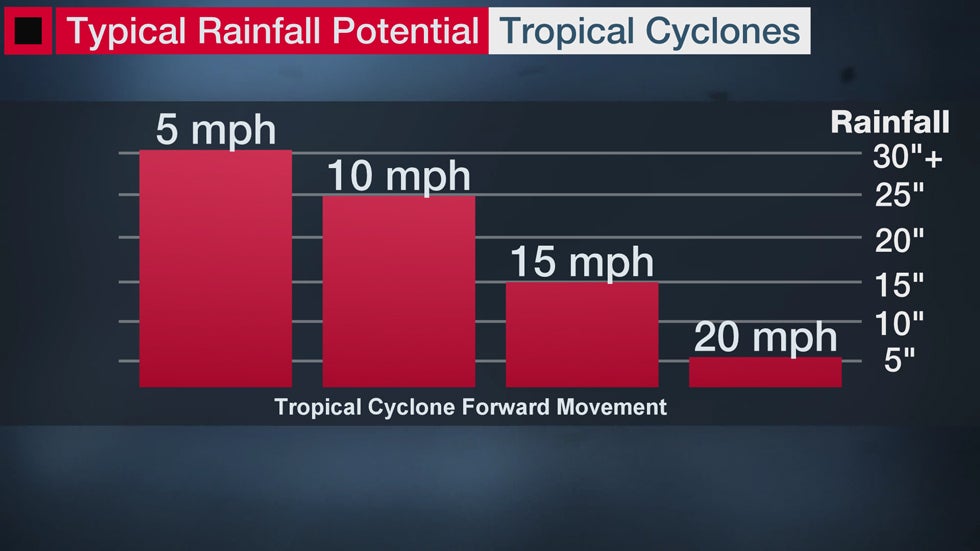Jonathan Erdman
One of a hurricane or tropical storm's deadliest threats doesn't depend on how strong it is, but rather how slow it moves.
About 27% of all U.S. hurricane and tropical storm deaths from 1963 to 2012 were from rainfall flooding. Strong winds contributed to only 8% of the deaths during that time. The majority of the deaths – 49% – were from storm surge.
The familiar "Category 1" through "Category 5" labels from Saffir Simpson Hurricane Wind Scale that we've all grown accustomed to mean little for this particular danger.
Instead, the amount of rain a tropical depression, tropical storm or hurricane can produce is a function of its forward speed. The slower it moves, the more incredible the rainfall amounts, as you can see in the graph below.
(MORE: Why You Should Pay Attention to a Hurricane's Forward Speed)

(MORE: Water is Deadliest Factor in U.S. Hurricanes and Tropical Storms)
Recent Examples
A number of storms in recent years triggered prolific flooding, yet never became intense hurricanes.
In mid-September 2019, Imelda was no stronger than a 45-mph tropical storm as it made landfall along the upper Texas coast. But it slowed its forward speed to less than 5 mph the following day and meandered over east Texas, dumping up to 44 inches of rain near Beaumont, Texas. Imelda's massive flooding claimed five lives in Texas.
Similar to Imelda, 2001's Tropical Storm Allison also made landfall along the upper Texas coast.
But then its remnant lingered in east Texas before turning back south over the upper Texas coast, triggering catastrophic flooding in the Houston metro area. Twenty-three lives in Texas were lost due to the flooding.
 U.S. Highway 59 in Houston, Texas flooded by Allison's rain on June 10, 2001.
U.S. Highway 59 in Houston, Texas flooded by Allison's rain on June 10, 2001.Some stronger hurricanes were prolific flood producers well after they reached their peak wind intensity.
In 2017, Hurricane Harvey pummeled the Texas coast near Rockport at Category 4 strength with destructive storm surge and winds.
But Harvey's agonizingly slow meander as a tropical storm for five days after landfall near the Texas coast solidified its place in history.
Nederland, Texas, measured 60.58 inches of rain from Harvey – the heaviest rainfall total from any tropical cyclone in the U.S. on record – which resulted in massive flooding and 68 deaths in Texas alone.

Just over a year later in 2018, Hurricane Florence weakened to Category 1 intensity at landfall near Wilmington, North Carolina, after it previously reached Category 4 strength in the Bermuda Triangle.
But Florence then hit the brakes and crawled west through South Carolina, then north through the Appalachians over three days, with massive flooding in the Carolinas and parts of Virginia the result.
Florence became the nation's second-wettest tropical cyclone behind Harvey. State rainfall records were set in both North and South Carolina, with up to 35.93 inches of rain recorded.
Slowing Trend
It appears climate change may be playing a role, as well.
A 2018 study found forward speeds of tropical cyclones across the globe have decreased by about 10 percent since 1949.
NOAA's National Centers for Environmental Information (NCEI) scientist James Kossin, author of the study, found a 20 percent slowdown in a storm's forward velocity over land for Atlantic storms.
Again, all other factors equal, slower-moving storms will spend more time over an area and are more likely to dump heavier rain.
The Weather Company’s primary journalistic mission is to report on breaking weather news, the environment and the importance of science to our lives. This story does not necessarily represent the position of our parent company, IBM.
The Weather Company’s primary journalistic mission is to report on breaking weather news, the environment and the importance of science to our lives. This story does not necessarily represent the position of our parent company, IBM.

No comments:
Post a Comment